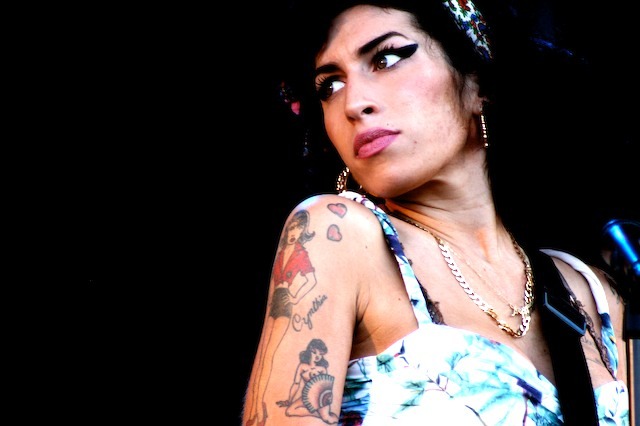The Essence of an Artist: The Tumultuous Discourse Surrounding ‘Back to Black’ and the Art of Honouring a Legend
On April 12th 2024, Sam Taylor-Johnson’s film, Back to Black, a biopic of London soul and jazz singer, Amy Winehouse, is set to be released to a UK audience. Whilst at the time of writing this article the majority of British moviegoers are yet to see this thought-provoking movie, many have already shared their opinions.
Acting as a teaser to the movie, STUDIOCANAL released a clip entitled ‘Amy’s Career Start’, starring Marisa Abela singing Winehouse’s hit ‘Stronger Than Me’ from her 2003 debut album Frank – and to say this early release was a mistake would only be the start. Many a fan of Amy, and everything she stood for, rushed to social media to share their disappointment over Abela’s performance, with X users stating “this is the worst Karaoke I’ve ever seen”, and going as far as to say that the filmmakers should be arrested for their cheap portrayal of Winehouse’s unique vocals. Critics alike shared their disdain, with Far Out magazine suggesting this clip will begin Back to Black’s descent into the category of cheap and lazy entertainment.
There is no linear checklist for a biopic to be a box office hit
Nevertheless, I suppose this brief snippet of the movie is defendable, and it would be impossible to make a thorough judgement from a ninety-second clip. However, when it comes to musical biopics, their success can be incredibly unpredictable, with some hitting the mark, while others miss it completely.
There is no linear checklist for a biopic to be a box office hit. If a movie-lover sees a film advertised based upon their all-time favourite singer, they will absolutely venture to the cinema and watch it for themselves. However, for a biopic to be a cinematographic success, it is essential to strike a balance between two key aspects – an actor who bears a striking physical resemblance to the artist they’re portraying, who also possesses the similar vocal nuances to the artist to pay a respectful homage.
Arguably, the modern-day musical biopic that springs to mind that finds balance of this is Dexter Fletcher’s 2019 Rocketman, starring Taron Egerton as British icon, Sir Elton John. Receiving a four star review from Rolling Stone, Egerton’s likeness to Elton, and use of his own voice, transforms him into a virtuoso of his craft, with incredible vocals and a more than memorable soundtrack. A similar sentiment can be given to Baz Luhrmann’s Elvis, with Austin Butler’s performance being depicted as a ‘blistering, turbocharged chronicle of the King’ by renowned critic Mark Kermode. The core takeaway from the success stories of Rocketman and Elvis is that the performances were a respectful tribute to the artists themselves, from both voice and acting portrayal.
However, when an artist has too distinct a voice to be replicated precisely, filmmakers can opt for the dubbed music approach, as seen in Bryan Singer’s Bohemian Rhapsody. Whist Rami Malek did an amazing job of portraying the late rock icon Freddie Mercury, winning the Oscar for Best Actor in 2019, Mercury’s notably distinct voice required incorporation of his actual vocals using dubbing, resulting in a seamless combination with Malek’s legendary acting.
So why was this approach not used in Taylor-Johnson’s Back to Black, especially as Amy Winehouse has such a distinct and well-known voice. According to Taylor-Johnson herself, she recounts ‘discovering a talent like Marisa Abela is akin to finding gold dust’, praising Abela for her daily vocal training to prepare for the movie. However, Abela’s singing is not perfect, or ‘gold dust’, but who could portray the perfect Amy Winehouse voice apart from Amy Winehouse herself.
It feels far too soon for a widely publicised biopic to portray Winehouse’s captivating yet tragic life
Whilst critics have suggested London-born singer Raye would be perfect for the role, with many a Daily Mail article pointing out her ‘uncanny’ resemblance to Winehouse, both in voice and looks, Raye is only just starting her journey to success, possessing such a strong personal identity which makes her unsuitable for such a role.
Looks and voice aside, personally, it feels far too soon for a widely publicised biopic to portray Winehouse’s captivating yet tragic life. Winehouse only passed away as recently as 2011, following a life marked by struggles with addiction, toxic relationships, and misogyny, leaving this film to feel like a sloppy exploitation of her hardships and challenges in her later years. Now the London premiere has happened, the film’s depiction is become clearer, with Danny Leigh of the Financial Times stating Amy’s personal ‘demons, moxie, a London wit and razored intelligence’ are lost causes throughout the film.
Amy’s career, though tough, is forever worshipped, with her Grammy winning album Back to Black (2006) depicting the mess and chaos of being a woman in the rawest and most punchy way. Now, the eternal statement Back to Black is scorned by a film that, even from a ninety second clip, fails to encapsulate the true Amy. However, the UK release and public perceptions will undoubtedly shape the image of Amy, which is cherished and embraced on a global scale even to this day.

Comments